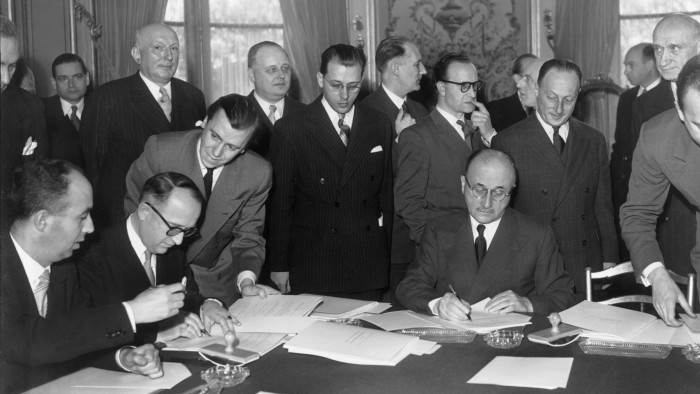Letter: Ukraine’s EU bid could do with the Schuman touch

Contrary to Henry Foy and Sam Fleming’s article, which in the online version carried the headline “Brussels urged to rein in Ukraine’s ‘unrealistic’ EU hopes” there is no lack of realism in Kyiv. Ukrainians know just how much work remains before they can join the EU. The fight to survive focuses the mind (Report, February 1).
Clearly a war has to be won first, and the Russian invader expelled from Ukrainian territory. Then Ukraine will turn with immense determination to ensure it meets EU accession criteria. Both Ukraine and the EU will find themselves in exceptional circumstances. No EU candidate state has ever sought membership following a war of national survival. The “unrealistic” can then become possible.
Those same officials of member states who take the view that EU membership for Ukraine is unrealistic may well have taken the same view of Robert Schuman’s 1950 declaration, proposing the creation of the European Coal and Steel Community. They might have asked: “Who does Mr Schuman think he is? How is it possible only five years after the end of world war two for Germany and France to come together and build a new European home? Surely after the ravages of war such a project is unrealistic — and doomed to take decades?”
How unrealistic is it for Kyiv to root out corruption? Will a society which has sacrificed so many of its children in battle allow a greedy few to steal the European future it has chosen? Is it not more likely that the population, civil society, veterans and political reformers, backed with EU and US support, deliver a decisive break with the past?
It is time for some EU capitals to show the vision, courage and stamina that we have seen across Ukraine over the past year. They might begin by seeing the vast opportunities that await. Ukraine’s accession will secure the union’s eastern flank. Its reconstruction will provide years of economic growth.
An immensely talented population will strengthen the single market. And the world’s most fertile land will deepen the union’s food security and open new access to significant rare earths, minerals and energy resources.
What are we waiting for?
Schuman would have surely recognised the opportunity to now build a great future for Europe with Ukraine.
Alan Riley and Jonathan Hill
Founders, Centre for a European Future,
Brussels, Belgium
Comments